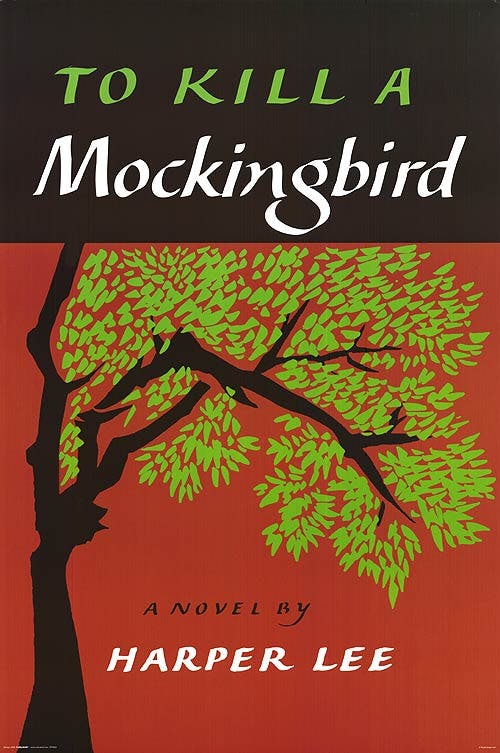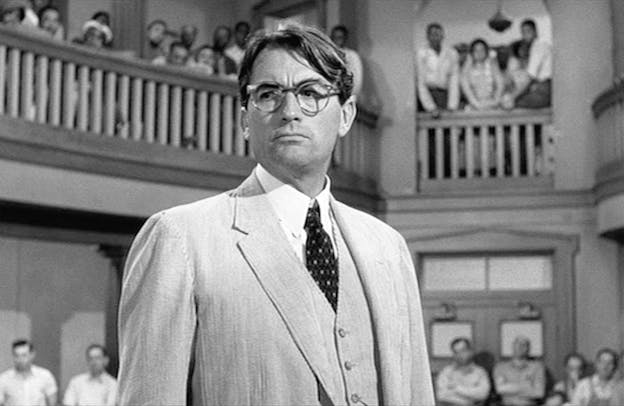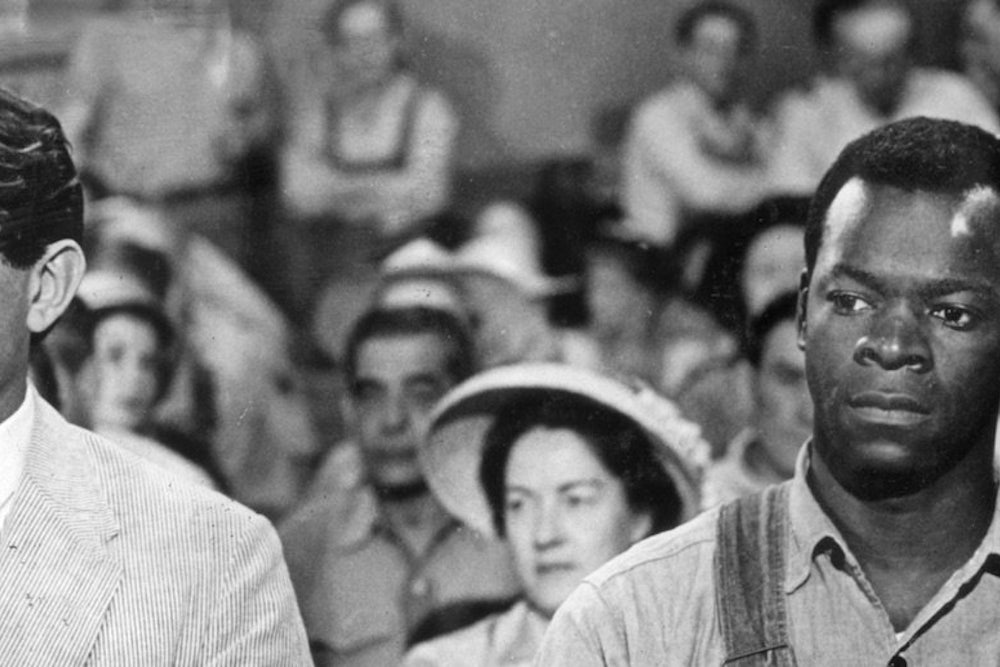This piece is the second in a three-part series we’ll be publishing this week on Harper Lee, To Kill a Mockingbird, and Lee’s new novel, Go Set a Watchman. Here’s the first installment.
You know about the plot of To Kill a Mockingbird, the two-part architecture: the Wordsworthian childhood sublime of Scout, Jem, and Dill, their summertime beguilement by Boo Radley, followed by Atticus Finch’s defense of the wrongly accused black man Tom Robinson. And you know about the rabid popularity: the novel’s pervasiveness in American middle and high schools, its still yearly robust sales figures, the one-time efforts to ban it—efforts that always achieve the inverse effect. Twain said it: the best way to catapult a book into best-sellerdom is to tell people they can’t have it. And as for that slur against Ms. Lee, “one-hit wonder”: most novelists are no-hit wonders.
The narration of Mockingbird belongs to the adult Jean Louise Finch; the eyes, however, belong wholly to the child Scout. Jean Louise Finch is consistently shrewd: “I was confronted with the Impurity of Women doctrine that seemed to preoccupy all clergymen”—with that sentence and others, you see you aren’t dealing with an obedient and blindly pious Southern woman. And Scout: the ceaseless charisma and comedic lean of that little girl. I imagine every reader must have his Scout moment, that satisfying click in the mind, the paragraph or line in which she does or says something, after which he is helplessly hers: He’ll follow her not only to the end of her book but to the end of the earth. For me it happens in chapter seven (a bit later than most, maybe): “The second grade was grim.”

An unsigned Time magazine review in 1960 saw that “Lee’s prose has an edge that cuts through cant,” and that’s well put. Mockingbird is rich with fluvial prose: “The night-crawlers had retired, but ripe chinaberries drummed on the roof when the wind stirred, and the darkness was desolate with the barking of distant dogs.” See the expertly placed and surprising adverb here: “The remains of a picket drunkenly guarded the front yard.” Notice the near onomatopoetic richness of this line: “We bounded down the sidewalk on a spree of sheer relief, leaping and howling.” For a novel of almost 400 pages, it’s blessedly inoculated against common prose germs. There is only the occasional cough of cliché: “snow white,” “ramrod straight,” “blaze of glory.” As some novelists know better than others, keeping paragraphs free of knee-jerk jargon and toneless formulations is the work of round-the-clock vigilance, and Harper Lee has always deserved more applause for the stride of her style.
You won’t find much literary comment on Mockingbird, and what does exist doesn’t much care about how Lee carpenters her prose. A smattering of early critics and reviewers were irked by the plot’s bifurcation. The New York Herald Tribune complained: “The charm and wistful humor of the childhood recollections do not foreshadow the deeper, harsher note which pervades the later pages of the book.” That goes out of its way to miss the point, since the first act of the novel is the crucial imaginative prelude to the moral reckoning of the second act: The childhood sublime must be celebrated if its later defacing by adulthood horrors, its asphyxiation by injustice and race hatred, is to have any effect.
Since the appearance of Mockingbird in 1960, some have had a hard time taking it seriously. In a letter to a friend in October of that year, Flannery O’Connor had this to say: “For a child’s book it does all right. It’s interesting that all the folks that are buying it don’t know they’re reading a child’s book. Somebody ought to say what it is.” I’m loath ever to be at odds with Ms. O’Connor, but I’ve got to say: Those lines hit my ear as distinctly bitter. The one word that shows her hand? Buying.
Curiously, those most qualified to comment upon Mockingbird chose not to do so. James Baldwin lived 27 more years after Mockingbird was published and nowhere in his collected essays, and nowhere in any interview I could find, does he see fit even to mention it. Ralph Ellison lived another 34 years after Mockingbird was published and nowhere in his collected essays, all 900 pages of them, does he see fit to mention it either. Edmund Wilson’s final journal, also 900 pages, goes from 1960, the year Mockingbird was published, to 1972, and not a peep. In fact, upon the novel’s publication and in the ensuing decades, the best American critical minds seem not to know that it exists—Granville Hicks, at one time a relevant (albeit Marxist) critic, gave it three short paragraphs in the Saturday Review, and in the 1990s Harold Bloom penned an abbreviated introduction for the Mockingbird installment of his “Modern Critical Interpretations” series. Even Updike, who in five dreadnoughts and one slimmer volume of literary criticism hardly leaves a necessary book untouched by his golden pen, says nothing of it. Capote’s endorsement of his friend’s book read: “Someone rare has written this very fine first novel, a writer with the liveliest sense of life, and the warmest, most authentic humor. A touching book, and so funny, so likable”—a somewhat neutered statement for Capote, redundant if true, and perhaps worth as much as any blurb.
In 1966, a scholar with the unimprovable name of W. J. Stuckey, in a book about Pulitzer-winning novels, impugned Lee for Mockingbird’s mobilizing of the child’s perspective in an adult’s language, tagging it a “rhetorical trick,” which gives those two terms quite a workout. “Whenever she gets into difficulties with one point of view,” wrote Stuckey, “she switches to the other”—but the point of view doesn’t switch, not in the way Stuckey suggests. As in the early books of Wordsworth’s Prelude, where the child’s vista is crooned in a poet’s tongue, the sophisticated Jean Louise Finch is free to summon and animate the Scout who breathes in her still. I don’t claim that as the ideal execution for a novel, nor that the liabilities of doing so aren’t legion, only that Lee’s method is consistent: There’s no clumsy juggling of the sort Stuckey perceives.
His suspicion is warranted but his diagnosis is wrong: One great flaw of Mockingbird is not an inconsistent point of view, but the fact that Scout can’t be the moral agent of her own story, an honor which goes to her father. That remains one of the pestering inevitabilities of the child-as-protagonist: Morality isn’t yet fully codified because apprehension and language are both constricted, which is precisely why so many child narrators must be cast as prodigies of verbiage and perception.
Scout isn’t cast as that—she’s not a child narrator and she’s not a prodigy. She’s an astute kid who can often apprehend the world’s oscillation from beauty to injustice and back again—and we get most of that apprehension in her dialogue, as we must—but the deepest seeing comes from the adult Jean Louise Finch: It is she who narrates Mockingbird, not her girlhood self, even though that girlhood self is the plot’s kindly tyrant. Harold Bloom puts it this way: “The crises of [Scout’s] book confirm her in her intrinsic strength and goodness, without wounding her sensibility or modifying her view of reality”—there’s the crux of the problem, and a problem not limited to Scout.
In 1957, the title of the book suggested by Lee’s first agent was Atticus, and you have no trouble seeing why: The portrait of Atticus Finch is a hymn of love to Harper Lee’s father, an attorney who in 1919 tried unsuccessfully to defend two black men from charges of murder. If Atticus strikes you as bloodless and wooden, that’s because he’s mostly a walking soapbox for moralistic bromides, incapable of talking to anyone without unburdening himself of some principled platitude. (Stuckey refers to the novel’s “simplistic moral,” to its being “self-consciously cute.”) It’s true that Atticus snaps to life in the courtroom while defending Tom Robinson—and it’s thrilling to watch him work on behalf of truth, even when you know the truth won’t matter—but that’s because the courtroom presents the perfect forum for his naturally grand exhortations.
The book’s superego, Atticus contains equal parts preternatural tolerance and rigid composure; he’s always hyperaware of showing his children all the upstanding ways to behave. Ever sunny toward the organic goodness of humanity—and ever Christic: “I do my best to love everybody,” he tells Scout—Atticus never suspects that his true moral duty might be to marshal an intolerance of intolerance. The day after Scout disperses the lynch mob on the steps of the jail, Atticus tells her and Jem that the leader, Mr. Cunningham, is “basically a good man … he just has his blind spots along with the rest of us.” That good man was about to murder an innocent human being—that’s quite a blind spot. The socially awakened Jem doesn’t let his father get away with such poltroon babble: “Don’t call that a blind spot,” he says. “He’da killed you last night.”

A vigilante and a bigot, Mr. Cunningham is not a good man, and Atticus’s refusal to say so, his refusal to acknowledge how the cretinous turn murderous, amounts to something of an intellectual crime against his children. He has all the right motions of the principled man but none of the fervor, the fed-up disgust required to assault the toxic tropisms of an entire segment of our society, those entrenched inequalities that cause the innocent to suffer. His courage is laudable—and never more so than on the steps of the jail when he blocks the lynch mob from reaching Tom Robinson—but without the stamina of a mobilizing conviction, courage counts for little, a mere gesture. This is part of what Twain means by: “We all live in the protection of certain cowardices which we call our principles.” In Twain’s 1923 essay "The United States of Lyncherdom," an objurgation of the unthinking imitator a human being can be, he writes: "Nothing but the martyr spirit can brave the lynching mob, and cow it and scatter it." If there’s such a thing as a passive martyr, Atticus is it.
Scout is frequently coupled with Huckleberry Finn—Twain’s influence on Lee was paramount—but look instead at Atticus and Huck, because Atticus is the moral nucleus of Mockingbird just as Huck is of his story. Huck's decision not to give up the slave Jim to the authorities, and to consign himself to hellfire as a result, is the transformative moment in American consciousness: After that display of mercy, of moral fearlessness, nothing can ever be the same. So if it's morally feel-good fiction we're looking for, you'd think we could do no better than Huckleberry Finn. But we don't have the same sentimental attachment to Twain's nation-shaking novel as we do to Mockingbird for the simple reason that Twain's book isn't sentimental. What Huck does takes much more courage than what Atticus does: Huck puts his own freedom in jeopardy—Atticus just follows his assignment.
Huckleberry Finn isn't feel-good because it demands action of us: It petitions us for sacrifice, and the typical American would rather not consider that. Mockingbird, meanwhile, doesn't ask us for anything so lofty: Just sit back and be charmed by that little girl, be pleased by the rectitude of her father. Loving and lauding Mockingbird assuages our self-blame, and in doing so, absolves us of responsibility. It feels good, it feels downright correct, to cherish this novel—it feels, come to think of it, rather like an honest day's work. It performs its magic first by suctioning itself to your own nostalgia and then by satisfying your limp conscience: As long as there are Atticuses in the world, all will be well, and you yourself can remain recumbent. We Americans prefer our morality reductive, and so the easily sloganized ethics of Mockingbird were and remain palatable for millions.
The debilitating flaw in Lee's construction of Atticus is having him assigned by the court to defend Tom Robinson rather than having him insist on serving as the innocent man's counsel—not because it’s his profession but because it’s his obligation. He tells Scout: “Every lawyer gets at least one case in his lifetime that affects him personally. This one’s mine, I guess.” Well, all right—but being affected is the least one should expect. Tom Robinson’s dooming by the jury should have shredded the very fabric of Atticus Finch. Where are the spiritual upheavals of this man, the vital defilements of his composure?
"Murder," wrote Graham Greene, "if you are going to treat it seriously at all, is a religious subject," and what are we talking about at the hub of Mockingbird if not murder? Hanged by a mob or hanged by the state, or shot attempting to escape, Tom Robinson is murdered. I’ve never believed the official line saying that Tom Robinson was killed trying to escape from the prison yard. Seventeen bullet wounds aren’t needed to keep a man from climbing a fence. “They didn’t have to shoot him that much,” Atticus says, but undergoes no religious quandary, no spiritual attrition, no weakening of his selfhood: He's dutifully upright and, in the final assessment, perfectly passive. Toni Morrison dismissed the novel as a “white savior” story, except that Atticus fails at saving Tom Robinson.
In the novel’s best known sentiment, Atticus says: “You never really understand a person until you consider things from his point of view … until you climb into his skin and walk around in it.” Already in chapter three you see the simplistic and naïve ethos that animates Atticus Finch: That use of “skin” is important, but otherwise, he doesn’t wish to admit that some points of view are pestiferous—they don’t need to be “considered,” they need to be quashed or else people suffer and die.
Jean Louise Finch says: “In the secret courts of men’s hearts Atticus had no case. Tom was a dead man the minute Mayella Ewell opened her mouth and screamed”—except that those secret inner courts aren’t so secret. When Mr. Raymond, the town’s pretend drunk, appears outside the courthouse with the children, he speaks of “the hell white people give colored folks, without even stopping to think that they’re people, too.” And after the trial, Atticus tell his children this: “There’s something in our world that makes men lose their heads—they couldn’t be fair if they tried. In our courts, when it’s a white man’s word against a black man’s, the white man always wins. They’re ugly, but those are the facts of life.”
As we had to witness recently with George Zimmerman and Trayvon Martin, and with Darren Wilson and Michael Brown, those ugly facts from the 1930s have proven their loathsome durability, except in those cases we didn’t have the words of the black men (boys, really) because they’d been shot dead. Go Set a Watchman is being published during a summer when the wounds of Ferguson still suppurate, when the city of Chicago is a weekly hecatomb, when ashes still darken the air of Baltimore, when a South Carolina police officer awaits trial for the on-camera killing of Walter Scott.
It took an imbecilic warp (I will not utter his name) assassinating nine peaceful human beings at a church in Charleston in June for South Carolina’s leaders to sprout a conscience and pack up an omnibigoted and insurrectionist flag—a nauseating cost. That butcher, by the way, repeated the same inherited and scurrilous falsehood that dooms Tom Robinson in Mockingbird: “You rape our women,” he reportedly said before opening fire. In the aftermath of the Charleston disaster, we saw, as we've seen again and again across history, the coming-together of the decent and the loving and the determined—we saw that the depths to which the depraved can sink will always be outshone by the heights to which the humane can rise.
Near the end of Mockingbird, in a line that reveals what she’s known all along, Scout tells her brother: “I think there’s just one kind of folks. Folks.” And Jem says: “I think I’m beginning to understand why Boo Radley’s stayed shut up in the house all this time … it’s because he wants to stay inside”—because it’s hard to be alive, because the world is both too hideous and too sublime for a soul that sensitive.
This is the second part of a three-part series on Lee, To Kill a Mockingbird, and Lee’s new novel, Go Set a Watchman. Read part one here. Check back later this week for part three.
